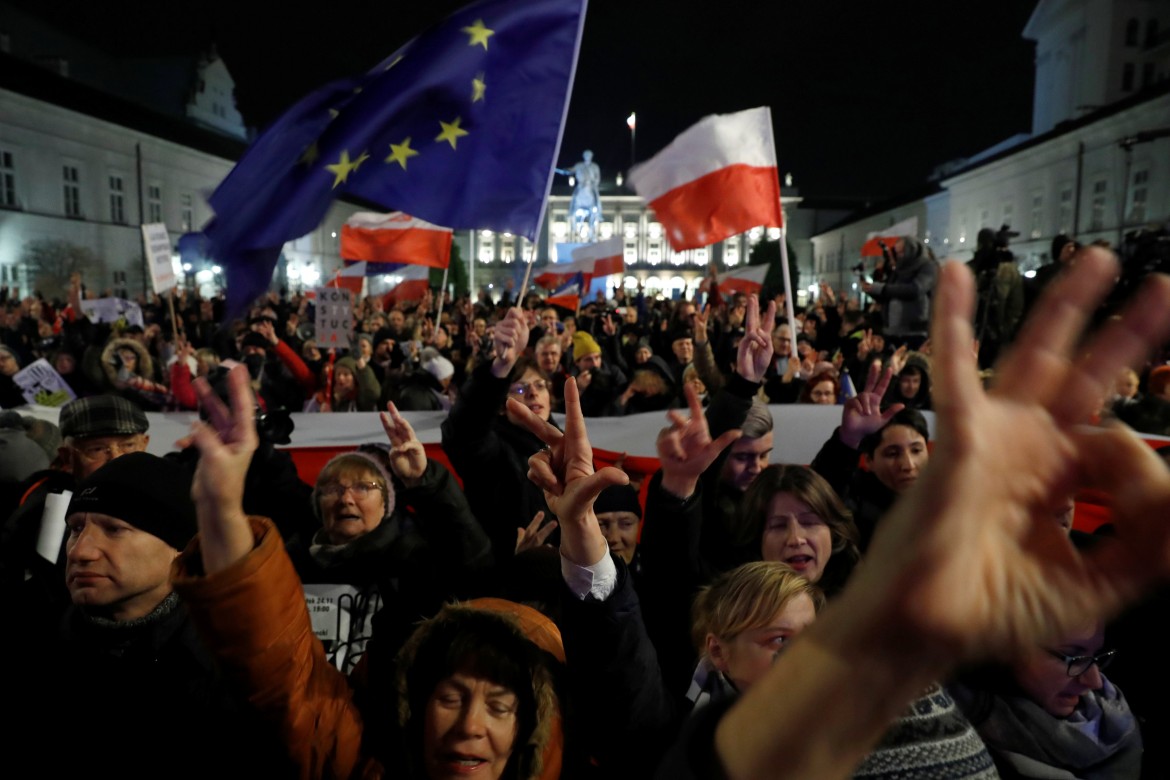Reportage
E.U. invokes ‘nuclear option’ against Poland
The European Commission has never attempted to activate Article 7 of the E.U. treaty, which includes possible sanctions, against a member state. Hungary has vowed to defend its far-right ally.

Gone are the days of mild-mannered recommendations: Brussels decided Wednesday to activate the procedure laid down in Article 7 of the Lisbon Treaty against Warsaw for risking a serious violation of the rule of law.
For the first time, the European Commission has chosen to resort to the so-called “nuclear option”—in the jargon of E.U. bureaucrats—which could also involve the suspension of Poland’s voting rights in the European Council.
On several previous occasions, the Commission threatened the application of Article 7 against Viktor Orban’s Hungary. Budapest remains today the strongest diplomatic ally of the populist right wing government of the Polish Law and Justice Party (PiS).
“Our country is ready to defend Poland against the unjust measures and political choices of the E.U.,” Zsolt Semjén, the Deputy Prime Minister of Hungary, said to PAP, the main Polish news agency, in the morning.
The only scenario that would allow the application of Article 7 would require Fidesz-ruled Hungary to waive its right to a veto. The process leading up to a final vote by the member states is quite complex. From the Commission, the file on the Warsaw case will be passed on to the E.U. Council, which, with the consent of Strasbourg, will need to get 22 votes out of the 27 cast by member countries in favor of applying the sanctions (Poland itself is excluded from voting). It is an entirely plausible scenario, barring possible obstruction from Budapest.
Regarding the timing, much will depend on the agenda of Bulgaria, which is preparing to take up the rotating E.U. presidency for the first six months of 2018.
The decision had been expected for several months, before the process suddenly started moving at an accelerated pace in recent days.
“We have to push for the procedure to be put into effect in a short time,” declared Guy Verhofstadt, leader of the Alliance of Liberals and Democrats for Europe in the European Parliament in Strasbourg.
His statement came after the decision by the National Broadcasting Council in Poland to fine the private channel TVN for having presented the protests during the Christmas period last year in front of the Sejm, the lower house of the Polish Parliament, in a “biased” manner. The president of the E.U. Commission, Jean-Claude Juncker, invited the new Polish prime minister, Mateusz Morawiecki, to Brussels, in another attempt to pursue the path of dialogue.
Meanwhile, the Polish President, Andrzej Duda, is about to sign two laws regarding the Supreme Court and the National Judicial Council.
Last summer, Duda, elected by the PiS majority, had vetoed two legal proposals regarding the same matters that had been approved by his party colleagues. However, the Polish president had signed a third proposal into law: The “super-Minister” of Justice, Zbigniew Ziobro, is now able to affect the appointment of the presidents of ordinary courts across the country.
Despite his two “nie” back then, Duda then worked on preparing two new measures on the same matters, which received the approval of the Parliament last week. Under these rules, 15 of the 25 members of the National Judicial Council will now have to be approved by the Sejm, and all the members of the Supreme Court aged 65 or more will be removed from office.
Furthermore, a disciplinary council will be set up to evaluate the performance of judges and lawyers throughout Poland. Thus, Brussels’ hopes to halt the process of politicization of the Polish justice system have now been reduced to nothing more than a faint glimmer.
The E.U. will nonetheless attempt to put pressure on PiS by threatening to reduce the flow of structural funds toward Warsaw.
Originally published at https://ilmanifesto.it/ue-contro-polonia-diritti-a-rischio/ on 2017-12-21
